Transformational Leadership and Turnover Intention
VerifiedAdded on 2020/05/28
|19
|3633
|184
AI Summary
This assignment investigates the influence of transformational leadership style on the relationship between personality type and turnover intention within the context of Saudi Arabian banking. It draws upon relevant theories and research to analyze how different personality traits interact with leadership styles and employee turnover decisions. The study aims to provide insights into factors that contribute to employee retention in the banking sector of Saudi Arabia.
Contribute Materials
Your contribution can guide someone’s learning journey. Share your
documents today.
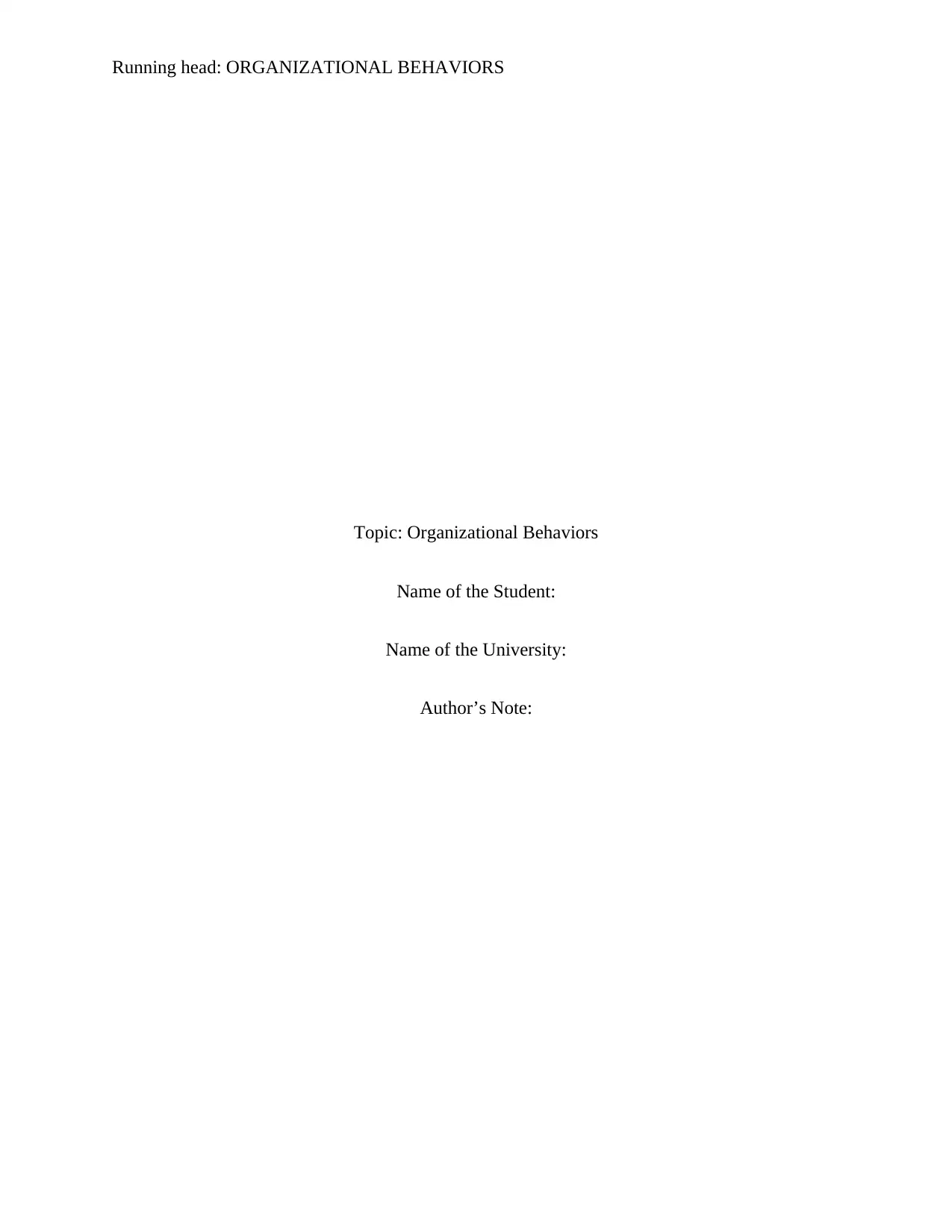
Running head: ORGANIZATIONAL BEHAVIORS
Topic: Organizational Behaviors
Name of the Student:
Name of the University:
Author’s Note:
Topic: Organizational Behaviors
Name of the Student:
Name of the University:
Author’s Note:
Secure Best Marks with AI Grader
Need help grading? Try our AI Grader for instant feedback on your assignments.
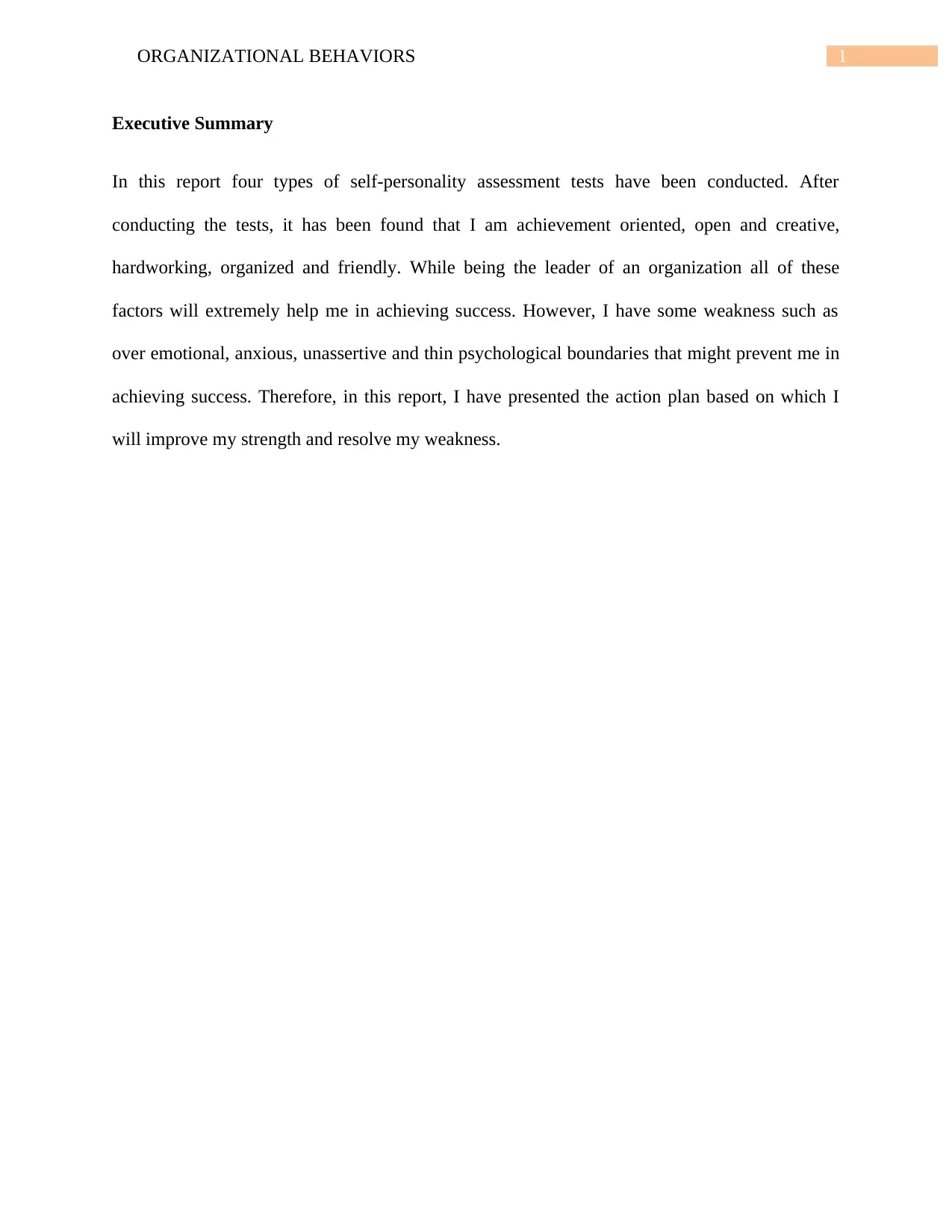
1ORGANIZATIONAL BEHAVIORS
Executive Summary
In this report four types of self-personality assessment tests have been conducted. After
conducting the tests, it has been found that I am achievement oriented, open and creative,
hardworking, organized and friendly. While being the leader of an organization all of these
factors will extremely help me in achieving success. However, I have some weakness such as
over emotional, anxious, unassertive and thin psychological boundaries that might prevent me in
achieving success. Therefore, in this report, I have presented the action plan based on which I
will improve my strength and resolve my weakness.
Executive Summary
In this report four types of self-personality assessment tests have been conducted. After
conducting the tests, it has been found that I am achievement oriented, open and creative,
hardworking, organized and friendly. While being the leader of an organization all of these
factors will extremely help me in achieving success. However, I have some weakness such as
over emotional, anxious, unassertive and thin psychological boundaries that might prevent me in
achieving success. Therefore, in this report, I have presented the action plan based on which I
will improve my strength and resolve my weakness.
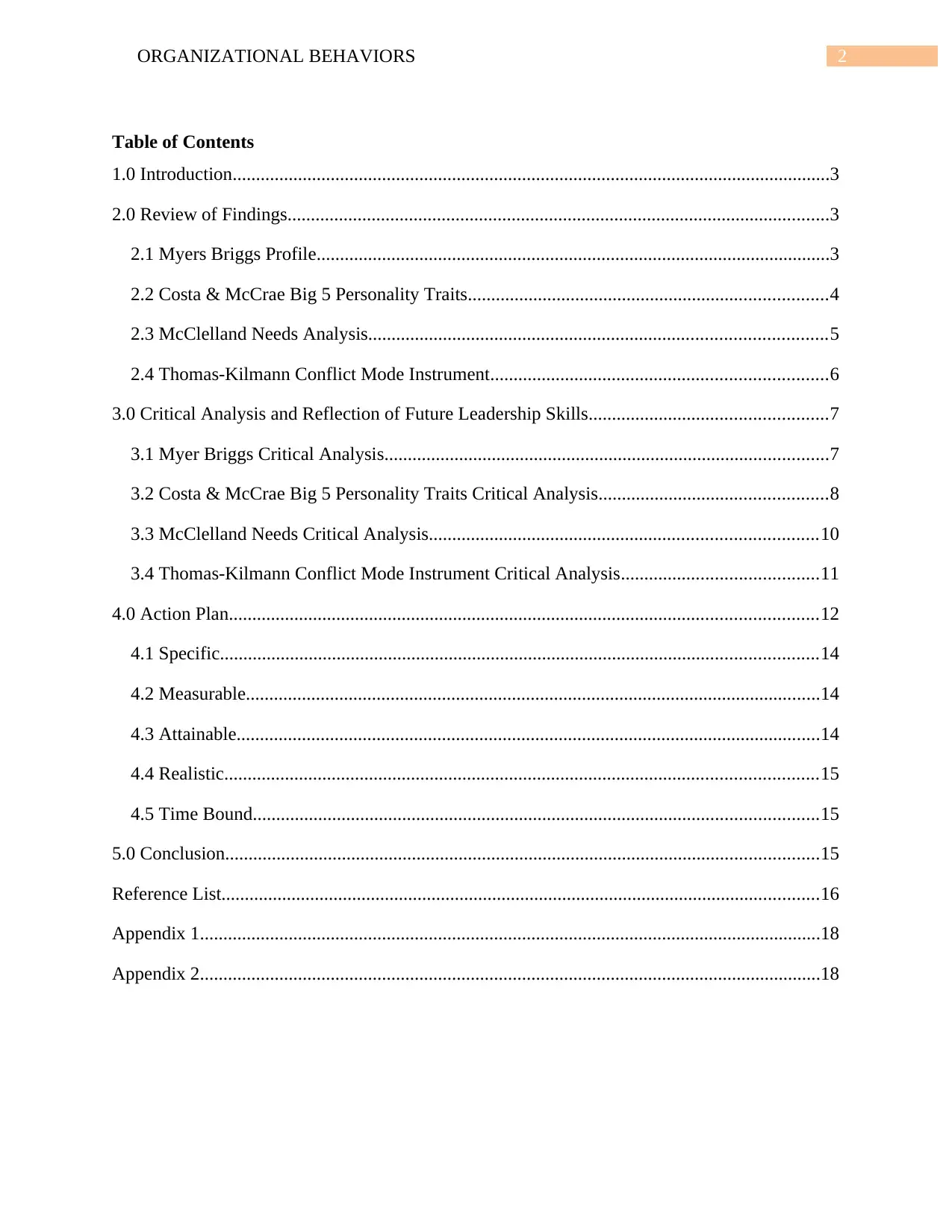
2ORGANIZATIONAL BEHAVIORS
Table of Contents
1.0 Introduction................................................................................................................................3
2.0 Review of Findings....................................................................................................................3
2.1 Myers Briggs Profile..............................................................................................................3
2.2 Costa & McCrae Big 5 Personality Traits.............................................................................4
2.3 McClelland Needs Analysis..................................................................................................5
2.4 Thomas-Kilmann Conflict Mode Instrument........................................................................6
3.0 Critical Analysis and Reflection of Future Leadership Skills...................................................7
3.1 Myer Briggs Critical Analysis...............................................................................................7
3.2 Costa & McCrae Big 5 Personality Traits Critical Analysis.................................................8
3.3 McClelland Needs Critical Analysis...................................................................................10
3.4 Thomas-Kilmann Conflict Mode Instrument Critical Analysis..........................................11
4.0 Action Plan..............................................................................................................................12
4.1 Specific................................................................................................................................14
4.2 Measurable...........................................................................................................................14
4.3 Attainable.............................................................................................................................14
4.4 Realistic...............................................................................................................................15
4.5 Time Bound.........................................................................................................................15
5.0 Conclusion...............................................................................................................................15
Reference List................................................................................................................................16
Appendix 1.....................................................................................................................................18
Appendix 2.....................................................................................................................................18
Table of Contents
1.0 Introduction................................................................................................................................3
2.0 Review of Findings....................................................................................................................3
2.1 Myers Briggs Profile..............................................................................................................3
2.2 Costa & McCrae Big 5 Personality Traits.............................................................................4
2.3 McClelland Needs Analysis..................................................................................................5
2.4 Thomas-Kilmann Conflict Mode Instrument........................................................................6
3.0 Critical Analysis and Reflection of Future Leadership Skills...................................................7
3.1 Myer Briggs Critical Analysis...............................................................................................7
3.2 Costa & McCrae Big 5 Personality Traits Critical Analysis.................................................8
3.3 McClelland Needs Critical Analysis...................................................................................10
3.4 Thomas-Kilmann Conflict Mode Instrument Critical Analysis..........................................11
4.0 Action Plan..............................................................................................................................12
4.1 Specific................................................................................................................................14
4.2 Measurable...........................................................................................................................14
4.3 Attainable.............................................................................................................................14
4.4 Realistic...............................................................................................................................15
4.5 Time Bound.........................................................................................................................15
5.0 Conclusion...............................................................................................................................15
Reference List................................................................................................................................16
Appendix 1.....................................................................................................................................18
Appendix 2.....................................................................................................................................18
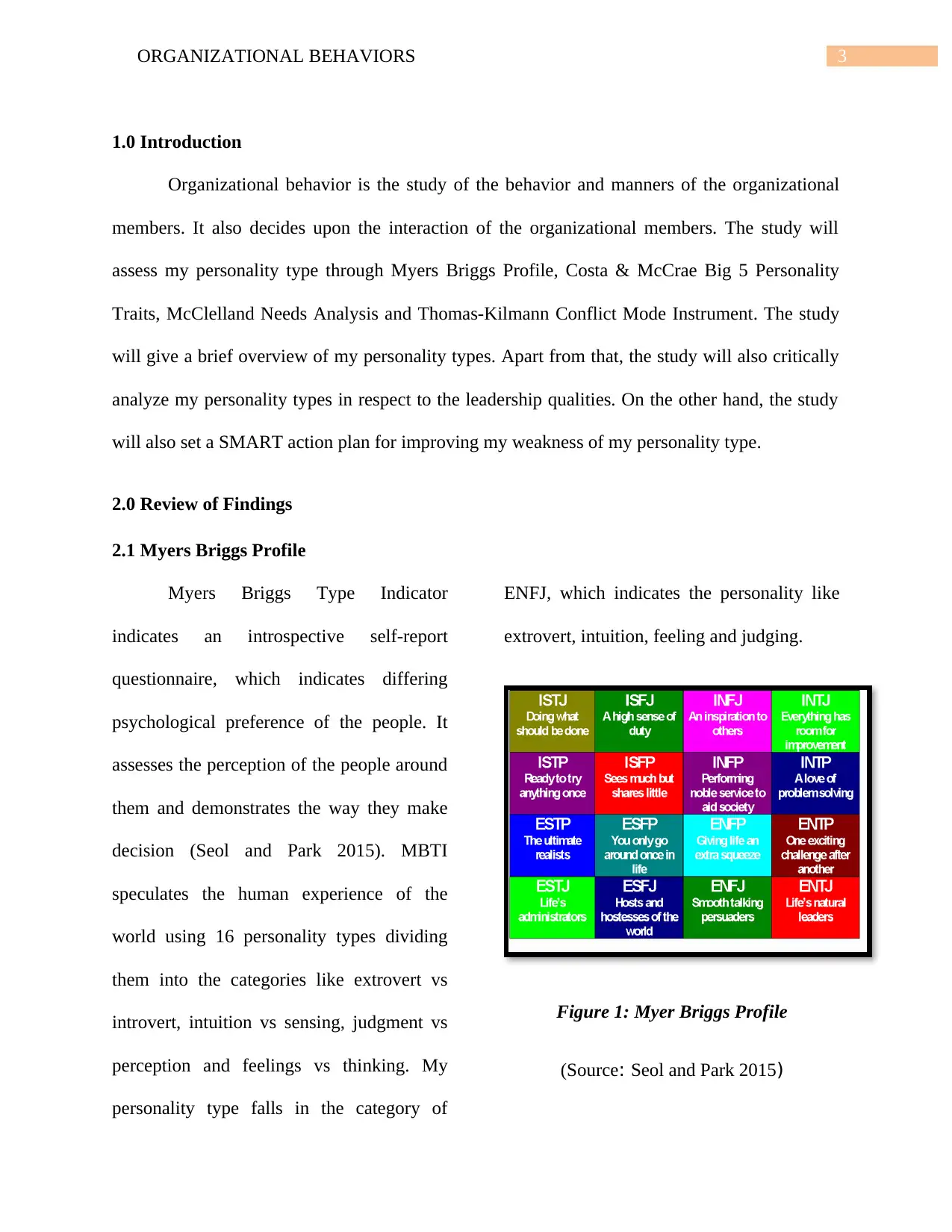
3ORGANIZATIONAL BEHAVIORS
1.0 Introduction
Organizational behavior is the study of the behavior and manners of the organizational
members. It also decides upon the interaction of the organizational members. The study will
assess my personality type through Myers Briggs Profile, Costa & McCrae Big 5 Personality
Traits, McClelland Needs Analysis and Thomas-Kilmann Conflict Mode Instrument. The study
will give a brief overview of my personality types. Apart from that, the study will also critically
analyze my personality types in respect to the leadership qualities. On the other hand, the study
will also set a SMART action plan for improving my weakness of my personality type.
2.0 Review of Findings
2.1 Myers Briggs Profile
Myers Briggs Type Indicator
indicates an introspective self-report
questionnaire, which indicates differing
psychological preference of the people. It
assesses the perception of the people around
them and demonstrates the way they make
decision (Seol and Park 2015). MBTI
speculates the human experience of the
world using 16 personality types dividing
them into the categories like extrovert vs
introvert, intuition vs sensing, judgment vs
perception and feelings vs thinking. My
personality type falls in the category of
ENFJ, which indicates the personality like
extrovert, intuition, feeling and judging.
Figure 1: Myer Briggs Profile
(Source: Seol and Park 2015)
1.0 Introduction
Organizational behavior is the study of the behavior and manners of the organizational
members. It also decides upon the interaction of the organizational members. The study will
assess my personality type through Myers Briggs Profile, Costa & McCrae Big 5 Personality
Traits, McClelland Needs Analysis and Thomas-Kilmann Conflict Mode Instrument. The study
will give a brief overview of my personality types. Apart from that, the study will also critically
analyze my personality types in respect to the leadership qualities. On the other hand, the study
will also set a SMART action plan for improving my weakness of my personality type.
2.0 Review of Findings
2.1 Myers Briggs Profile
Myers Briggs Type Indicator
indicates an introspective self-report
questionnaire, which indicates differing
psychological preference of the people. It
assesses the perception of the people around
them and demonstrates the way they make
decision (Seol and Park 2015). MBTI
speculates the human experience of the
world using 16 personality types dividing
them into the categories like extrovert vs
introvert, intuition vs sensing, judgment vs
perception and feelings vs thinking. My
personality type falls in the category of
ENFJ, which indicates the personality like
extrovert, intuition, feeling and judging.
Figure 1: Myer Briggs Profile
(Source: Seol and Park 2015)
Secure Best Marks with AI Grader
Need help grading? Try our AI Grader for instant feedback on your assignments.
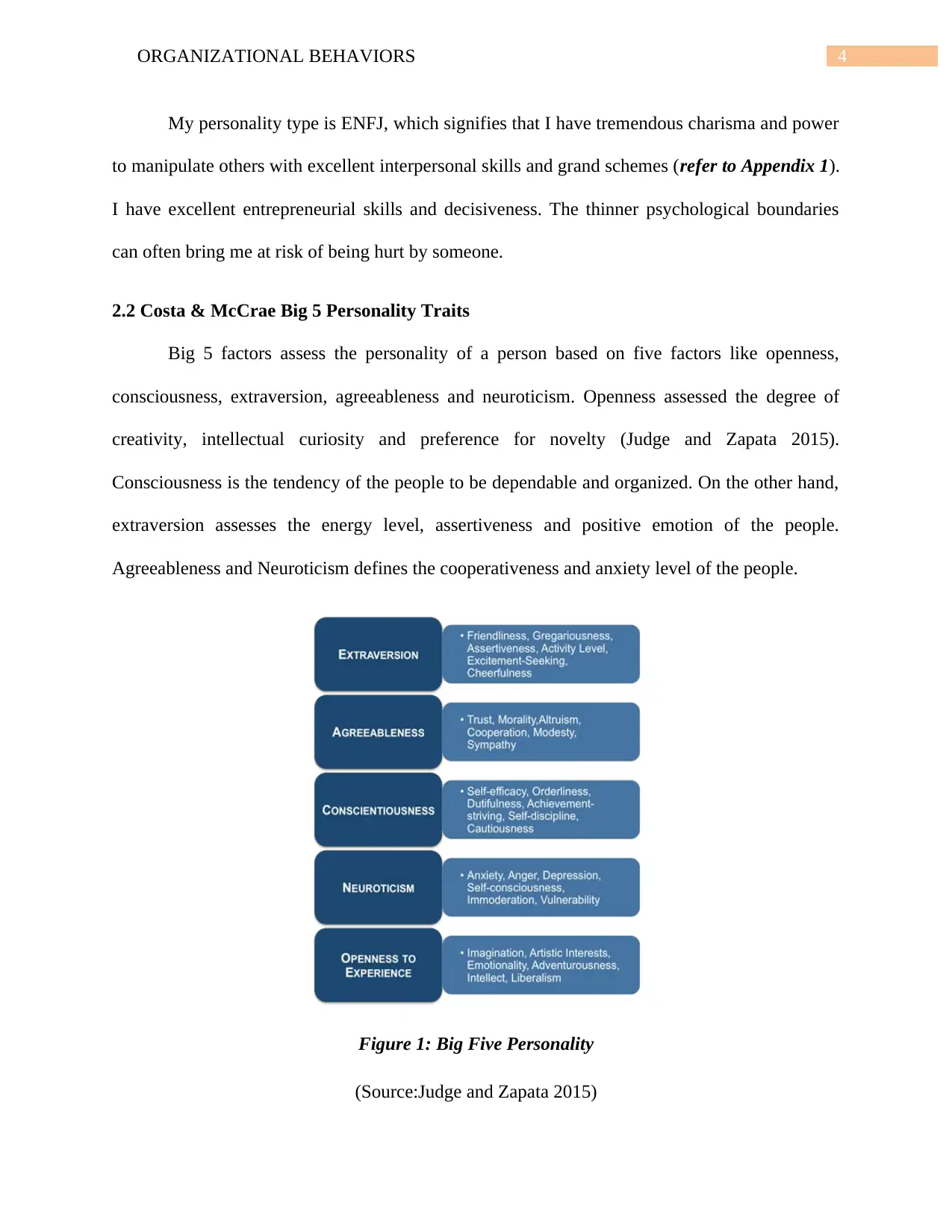
4ORGANIZATIONAL BEHAVIORS
My personality type is ENFJ, which signifies that I have tremendous charisma and power
to manipulate others with excellent interpersonal skills and grand schemes (refer to Appendix 1).
I have excellent entrepreneurial skills and decisiveness. The thinner psychological boundaries
can often bring me at risk of being hurt by someone.
2.2 Costa & McCrae Big 5 Personality Traits
Big 5 factors assess the personality of a person based on five factors like openness,
consciousness, extraversion, agreeableness and neuroticism. Openness assessed the degree of
creativity, intellectual curiosity and preference for novelty (Judge and Zapata 2015).
Consciousness is the tendency of the people to be dependable and organized. On the other hand,
extraversion assesses the energy level, assertiveness and positive emotion of the people.
Agreeableness and Neuroticism defines the cooperativeness and anxiety level of the people.
Figure 1: Big Five Personality
(Source:Judge and Zapata 2015)
My personality type is ENFJ, which signifies that I have tremendous charisma and power
to manipulate others with excellent interpersonal skills and grand schemes (refer to Appendix 1).
I have excellent entrepreneurial skills and decisiveness. The thinner psychological boundaries
can often bring me at risk of being hurt by someone.
2.2 Costa & McCrae Big 5 Personality Traits
Big 5 factors assess the personality of a person based on five factors like openness,
consciousness, extraversion, agreeableness and neuroticism. Openness assessed the degree of
creativity, intellectual curiosity and preference for novelty (Judge and Zapata 2015).
Consciousness is the tendency of the people to be dependable and organized. On the other hand,
extraversion assesses the energy level, assertiveness and positive emotion of the people.
Agreeableness and Neuroticism defines the cooperativeness and anxiety level of the people.
Figure 1: Big Five Personality
(Source:Judge and Zapata 2015)
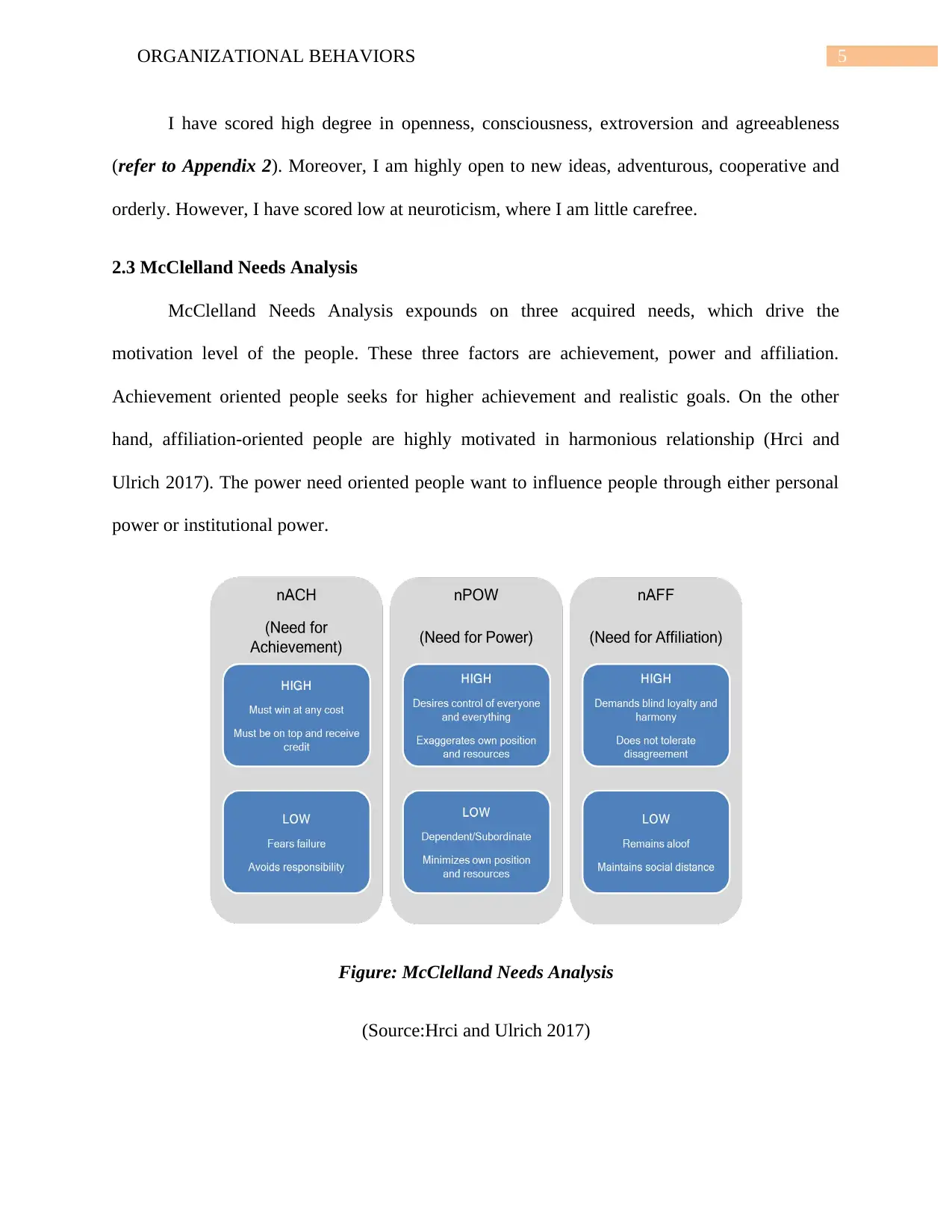
5ORGANIZATIONAL BEHAVIORS
I have scored high degree in openness, consciousness, extroversion and agreeableness
(refer to Appendix 2). Moreover, I am highly open to new ideas, adventurous, cooperative and
orderly. However, I have scored low at neuroticism, where I am little carefree.
2.3 McClelland Needs Analysis
McClelland Needs Analysis expounds on three acquired needs, which drive the
motivation level of the people. These three factors are achievement, power and affiliation.
Achievement oriented people seeks for higher achievement and realistic goals. On the other
hand, affiliation-oriented people are highly motivated in harmonious relationship (Hrci and
Ulrich 2017). The power need oriented people want to influence people through either personal
power or institutional power.
Figure: McClelland Needs Analysis
(Source:Hrci and Ulrich 2017)
I have scored high degree in openness, consciousness, extroversion and agreeableness
(refer to Appendix 2). Moreover, I am highly open to new ideas, adventurous, cooperative and
orderly. However, I have scored low at neuroticism, where I am little carefree.
2.3 McClelland Needs Analysis
McClelland Needs Analysis expounds on three acquired needs, which drive the
motivation level of the people. These three factors are achievement, power and affiliation.
Achievement oriented people seeks for higher achievement and realistic goals. On the other
hand, affiliation-oriented people are highly motivated in harmonious relationship (Hrci and
Ulrich 2017). The power need oriented people want to influence people through either personal
power or institutional power.
Figure: McClelland Needs Analysis
(Source:Hrci and Ulrich 2017)
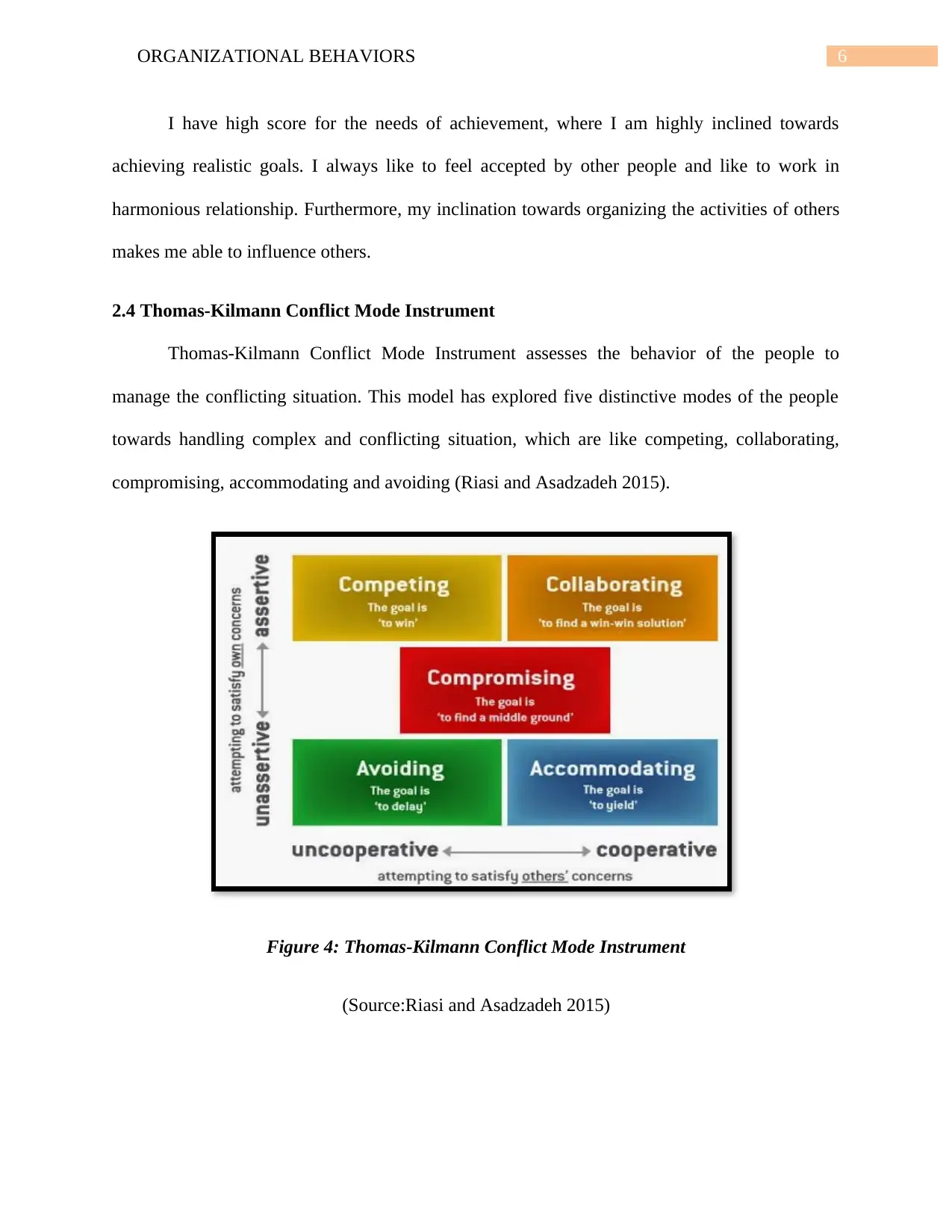
6ORGANIZATIONAL BEHAVIORS
I have high score for the needs of achievement, where I am highly inclined towards
achieving realistic goals. I always like to feel accepted by other people and like to work in
harmonious relationship. Furthermore, my inclination towards organizing the activities of others
makes me able to influence others.
2.4 Thomas-Kilmann Conflict Mode Instrument
Thomas-Kilmann Conflict Mode Instrument assesses the behavior of the people to
manage the conflicting situation. This model has explored five distinctive modes of the people
towards handling complex and conflicting situation, which are like competing, collaborating,
compromising, accommodating and avoiding (Riasi and Asadzadeh 2015).
Figure 4: Thomas-Kilmann Conflict Mode Instrument
(Source:Riasi and Asadzadeh 2015)
I have high score for the needs of achievement, where I am highly inclined towards
achieving realistic goals. I always like to feel accepted by other people and like to work in
harmonious relationship. Furthermore, my inclination towards organizing the activities of others
makes me able to influence others.
2.4 Thomas-Kilmann Conflict Mode Instrument
Thomas-Kilmann Conflict Mode Instrument assesses the behavior of the people to
manage the conflicting situation. This model has explored five distinctive modes of the people
towards handling complex and conflicting situation, which are like competing, collaborating,
compromising, accommodating and avoiding (Riasi and Asadzadeh 2015).
Figure 4: Thomas-Kilmann Conflict Mode Instrument
(Source:Riasi and Asadzadeh 2015)
Paraphrase This Document
Need a fresh take? Get an instant paraphrase of this document with our AI Paraphraser
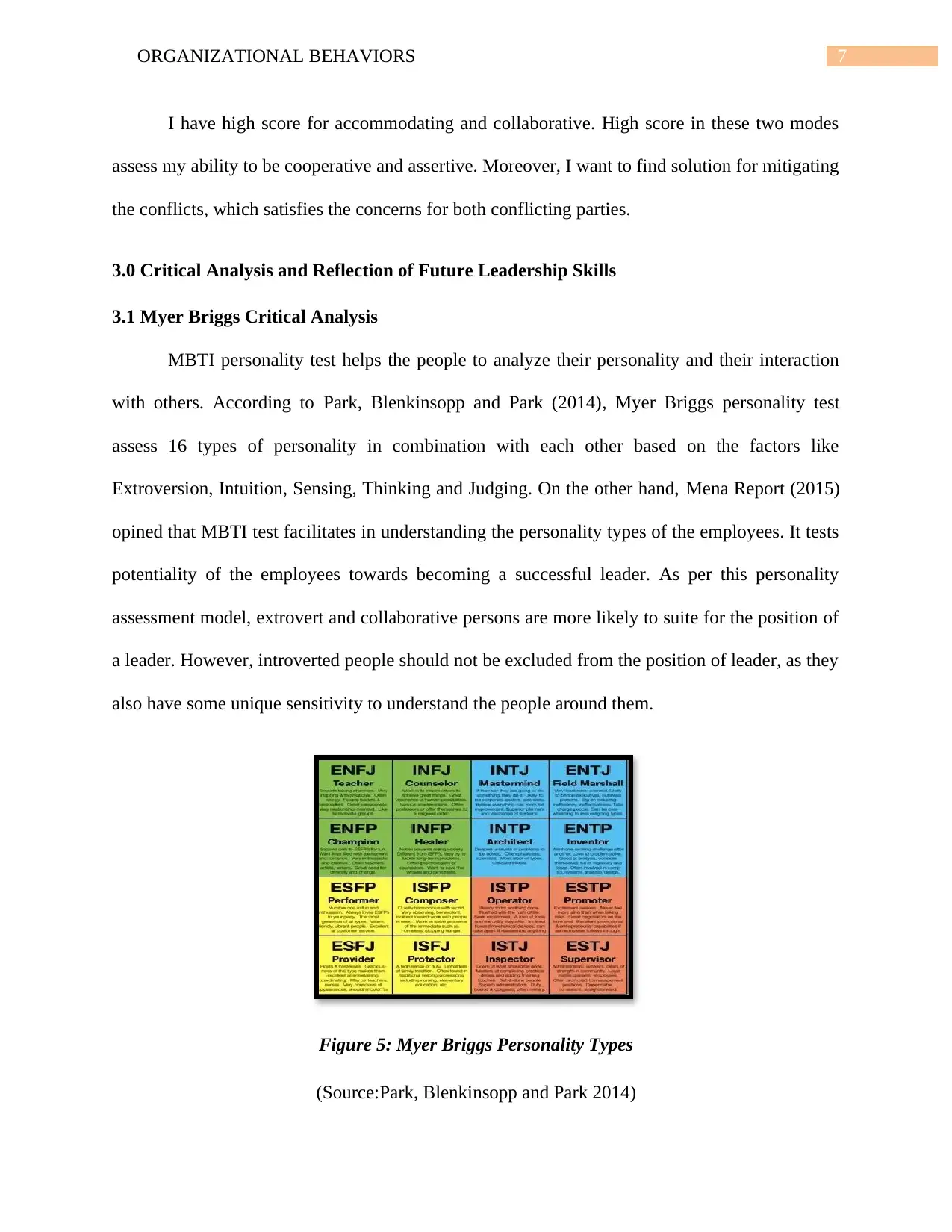
7ORGANIZATIONAL BEHAVIORS
I have high score for accommodating and collaborative. High score in these two modes
assess my ability to be cooperative and assertive. Moreover, I want to find solution for mitigating
the conflicts, which satisfies the concerns for both conflicting parties.
3.0 Critical Analysis and Reflection of Future Leadership Skills
3.1 Myer Briggs Critical Analysis
MBTI personality test helps the people to analyze their personality and their interaction
with others. According to Park, Blenkinsopp and Park (2014), Myer Briggs personality test
assess 16 types of personality in combination with each other based on the factors like
Extroversion, Intuition, Sensing, Thinking and Judging. On the other hand, Mena Report (2015)
opined that MBTI test facilitates in understanding the personality types of the employees. It tests
potentiality of the employees towards becoming a successful leader. As per this personality
assessment model, extrovert and collaborative persons are more likely to suite for the position of
a leader. However, introverted people should not be excluded from the position of leader, as they
also have some unique sensitivity to understand the people around them.
Figure 5: Myer Briggs Personality Types
(Source:Park, Blenkinsopp and Park 2014)
I have high score for accommodating and collaborative. High score in these two modes
assess my ability to be cooperative and assertive. Moreover, I want to find solution for mitigating
the conflicts, which satisfies the concerns for both conflicting parties.
3.0 Critical Analysis and Reflection of Future Leadership Skills
3.1 Myer Briggs Critical Analysis
MBTI personality test helps the people to analyze their personality and their interaction
with others. According to Park, Blenkinsopp and Park (2014), Myer Briggs personality test
assess 16 types of personality in combination with each other based on the factors like
Extroversion, Intuition, Sensing, Thinking and Judging. On the other hand, Mena Report (2015)
opined that MBTI test facilitates in understanding the personality types of the employees. It tests
potentiality of the employees towards becoming a successful leader. As per this personality
assessment model, extrovert and collaborative persons are more likely to suite for the position of
a leader. However, introverted people should not be excluded from the position of leader, as they
also have some unique sensitivity to understand the people around them.
Figure 5: Myer Briggs Personality Types
(Source:Park, Blenkinsopp and Park 2014)
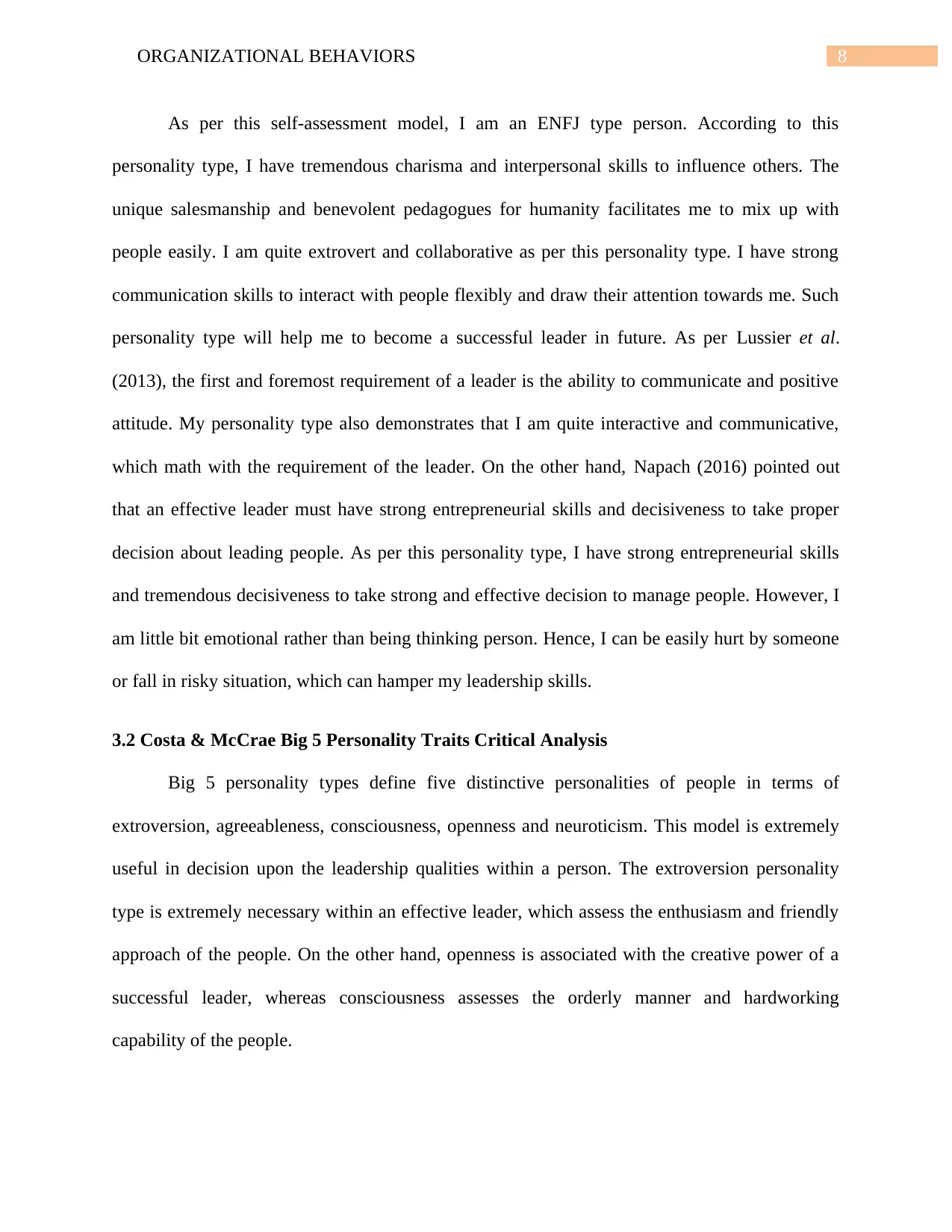
8ORGANIZATIONAL BEHAVIORS
As per this self-assessment model, I am an ENFJ type person. According to this
personality type, I have tremendous charisma and interpersonal skills to influence others. The
unique salesmanship and benevolent pedagogues for humanity facilitates me to mix up with
people easily. I am quite extrovert and collaborative as per this personality type. I have strong
communication skills to interact with people flexibly and draw their attention towards me. Such
personality type will help me to become a successful leader in future. As per Lussier et al.
(2013), the first and foremost requirement of a leader is the ability to communicate and positive
attitude. My personality type also demonstrates that I am quite interactive and communicative,
which math with the requirement of the leader. On the other hand, Napach (2016) pointed out
that an effective leader must have strong entrepreneurial skills and decisiveness to take proper
decision about leading people. As per this personality type, I have strong entrepreneurial skills
and tremendous decisiveness to take strong and effective decision to manage people. However, I
am little bit emotional rather than being thinking person. Hence, I can be easily hurt by someone
or fall in risky situation, which can hamper my leadership skills.
3.2 Costa & McCrae Big 5 Personality Traits Critical Analysis
Big 5 personality types define five distinctive personalities of people in terms of
extroversion, agreeableness, consciousness, openness and neuroticism. This model is extremely
useful in decision upon the leadership qualities within a person. The extroversion personality
type is extremely necessary within an effective leader, which assess the enthusiasm and friendly
approach of the people. On the other hand, openness is associated with the creative power of a
successful leader, whereas consciousness assesses the orderly manner and hardworking
capability of the people.
As per this self-assessment model, I am an ENFJ type person. According to this
personality type, I have tremendous charisma and interpersonal skills to influence others. The
unique salesmanship and benevolent pedagogues for humanity facilitates me to mix up with
people easily. I am quite extrovert and collaborative as per this personality type. I have strong
communication skills to interact with people flexibly and draw their attention towards me. Such
personality type will help me to become a successful leader in future. As per Lussier et al.
(2013), the first and foremost requirement of a leader is the ability to communicate and positive
attitude. My personality type also demonstrates that I am quite interactive and communicative,
which math with the requirement of the leader. On the other hand, Napach (2016) pointed out
that an effective leader must have strong entrepreneurial skills and decisiveness to take proper
decision about leading people. As per this personality type, I have strong entrepreneurial skills
and tremendous decisiveness to take strong and effective decision to manage people. However, I
am little bit emotional rather than being thinking person. Hence, I can be easily hurt by someone
or fall in risky situation, which can hamper my leadership skills.
3.2 Costa & McCrae Big 5 Personality Traits Critical Analysis
Big 5 personality types define five distinctive personalities of people in terms of
extroversion, agreeableness, consciousness, openness and neuroticism. This model is extremely
useful in decision upon the leadership qualities within a person. The extroversion personality
type is extremely necessary within an effective leader, which assess the enthusiasm and friendly
approach of the people. On the other hand, openness is associated with the creative power of a
successful leader, whereas consciousness assesses the orderly manner and hardworking
capability of the people.
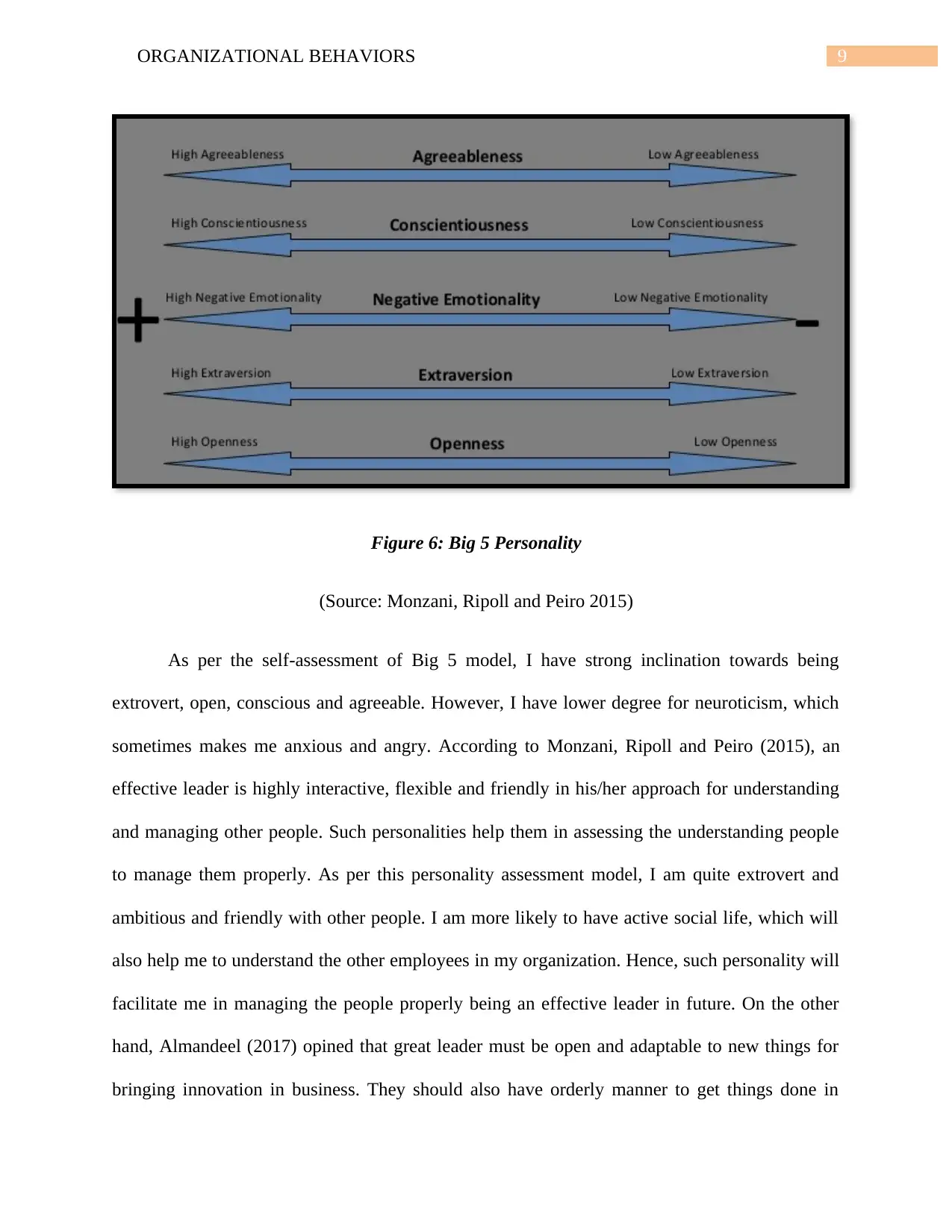
9ORGANIZATIONAL BEHAVIORS
Figure 6: Big 5 Personality
(Source: Monzani, Ripoll and Peiro 2015)
As per the self-assessment of Big 5 model, I have strong inclination towards being
extrovert, open, conscious and agreeable. However, I have lower degree for neuroticism, which
sometimes makes me anxious and angry. According to Monzani, Ripoll and Peiro (2015), an
effective leader is highly interactive, flexible and friendly in his/her approach for understanding
and managing other people. Such personalities help them in assessing the understanding people
to manage them properly. As per this personality assessment model, I am quite extrovert and
ambitious and friendly with other people. I am more likely to have active social life, which will
also help me to understand the other employees in my organization. Hence, such personality will
facilitate me in managing the people properly being an effective leader in future. On the other
hand, Almandeel (2017) opined that great leader must be open and adaptable to new things for
bringing innovation in business. They should also have orderly manner to get things done in
Figure 6: Big 5 Personality
(Source: Monzani, Ripoll and Peiro 2015)
As per the self-assessment of Big 5 model, I have strong inclination towards being
extrovert, open, conscious and agreeable. However, I have lower degree for neuroticism, which
sometimes makes me anxious and angry. According to Monzani, Ripoll and Peiro (2015), an
effective leader is highly interactive, flexible and friendly in his/her approach for understanding
and managing other people. Such personalities help them in assessing the understanding people
to manage them properly. As per this personality assessment model, I am quite extrovert and
ambitious and friendly with other people. I am more likely to have active social life, which will
also help me to understand the other employees in my organization. Hence, such personality will
facilitate me in managing the people properly being an effective leader in future. On the other
hand, Almandeel (2017) opined that great leader must be open and adaptable to new things for
bringing innovation in business. They should also have orderly manner to get things done in
Secure Best Marks with AI Grader
Need help grading? Try our AI Grader for instant feedback on your assignments.
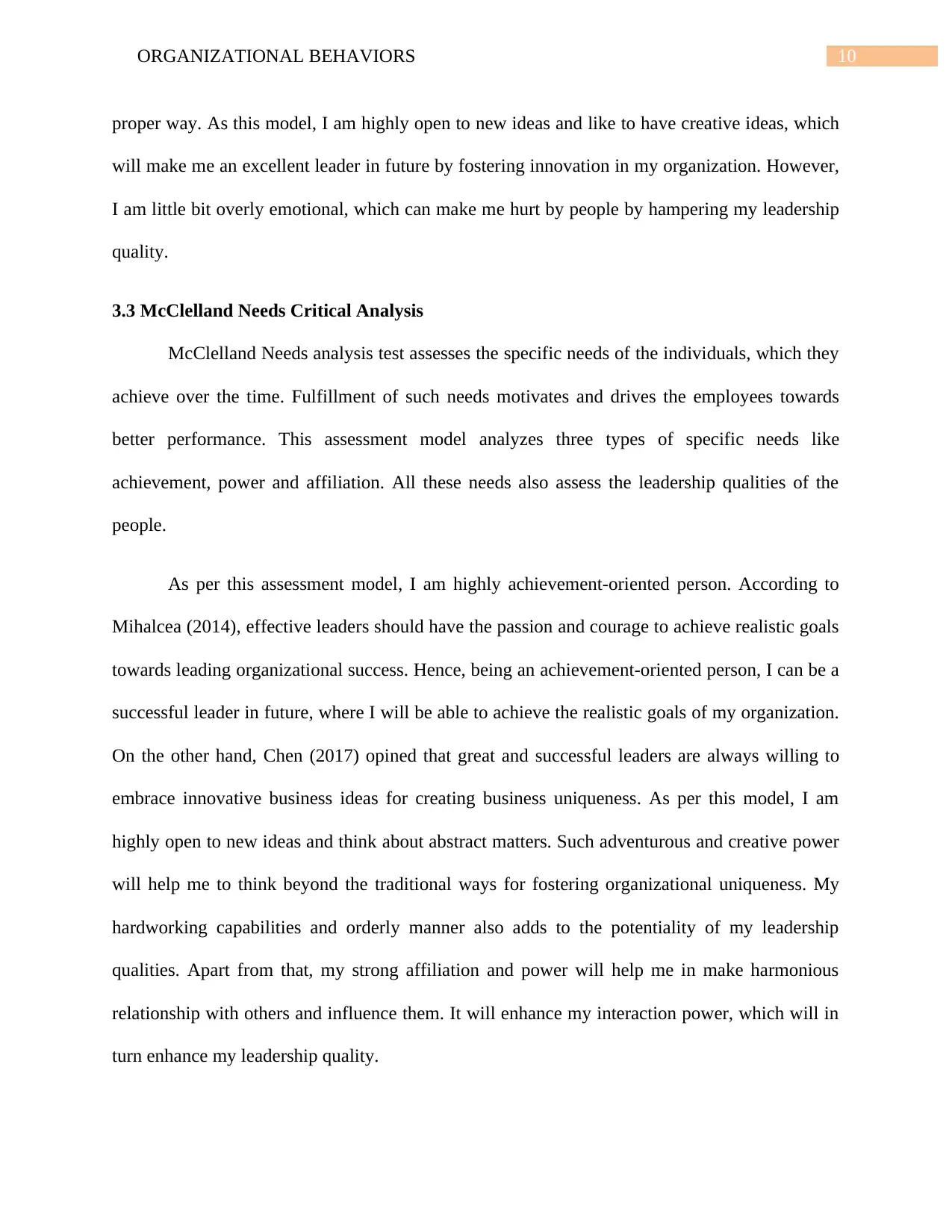
10ORGANIZATIONAL BEHAVIORS
proper way. As this model, I am highly open to new ideas and like to have creative ideas, which
will make me an excellent leader in future by fostering innovation in my organization. However,
I am little bit overly emotional, which can make me hurt by people by hampering my leadership
quality.
3.3 McClelland Needs Critical Analysis
McClelland Needs analysis test assesses the specific needs of the individuals, which they
achieve over the time. Fulfillment of such needs motivates and drives the employees towards
better performance. This assessment model analyzes three types of specific needs like
achievement, power and affiliation. All these needs also assess the leadership qualities of the
people.
As per this assessment model, I am highly achievement-oriented person. According to
Mihalcea (2014), effective leaders should have the passion and courage to achieve realistic goals
towards leading organizational success. Hence, being an achievement-oriented person, I can be a
successful leader in future, where I will be able to achieve the realistic goals of my organization.
On the other hand, Chen (2017) opined that great and successful leaders are always willing to
embrace innovative business ideas for creating business uniqueness. As per this model, I am
highly open to new ideas and think about abstract matters. Such adventurous and creative power
will help me to think beyond the traditional ways for fostering organizational uniqueness. My
hardworking capabilities and orderly manner also adds to the potentiality of my leadership
qualities. Apart from that, my strong affiliation and power will help me in make harmonious
relationship with others and influence them. It will enhance my interaction power, which will in
turn enhance my leadership quality.
proper way. As this model, I am highly open to new ideas and like to have creative ideas, which
will make me an excellent leader in future by fostering innovation in my organization. However,
I am little bit overly emotional, which can make me hurt by people by hampering my leadership
quality.
3.3 McClelland Needs Critical Analysis
McClelland Needs analysis test assesses the specific needs of the individuals, which they
achieve over the time. Fulfillment of such needs motivates and drives the employees towards
better performance. This assessment model analyzes three types of specific needs like
achievement, power and affiliation. All these needs also assess the leadership qualities of the
people.
As per this assessment model, I am highly achievement-oriented person. According to
Mihalcea (2014), effective leaders should have the passion and courage to achieve realistic goals
towards leading organizational success. Hence, being an achievement-oriented person, I can be a
successful leader in future, where I will be able to achieve the realistic goals of my organization.
On the other hand, Chen (2017) opined that great and successful leaders are always willing to
embrace innovative business ideas for creating business uniqueness. As per this model, I am
highly open to new ideas and think about abstract matters. Such adventurous and creative power
will help me to think beyond the traditional ways for fostering organizational uniqueness. My
hardworking capabilities and orderly manner also adds to the potentiality of my leadership
qualities. Apart from that, my strong affiliation and power will help me in make harmonious
relationship with others and influence them. It will enhance my interaction power, which will in
turn enhance my leadership quality.
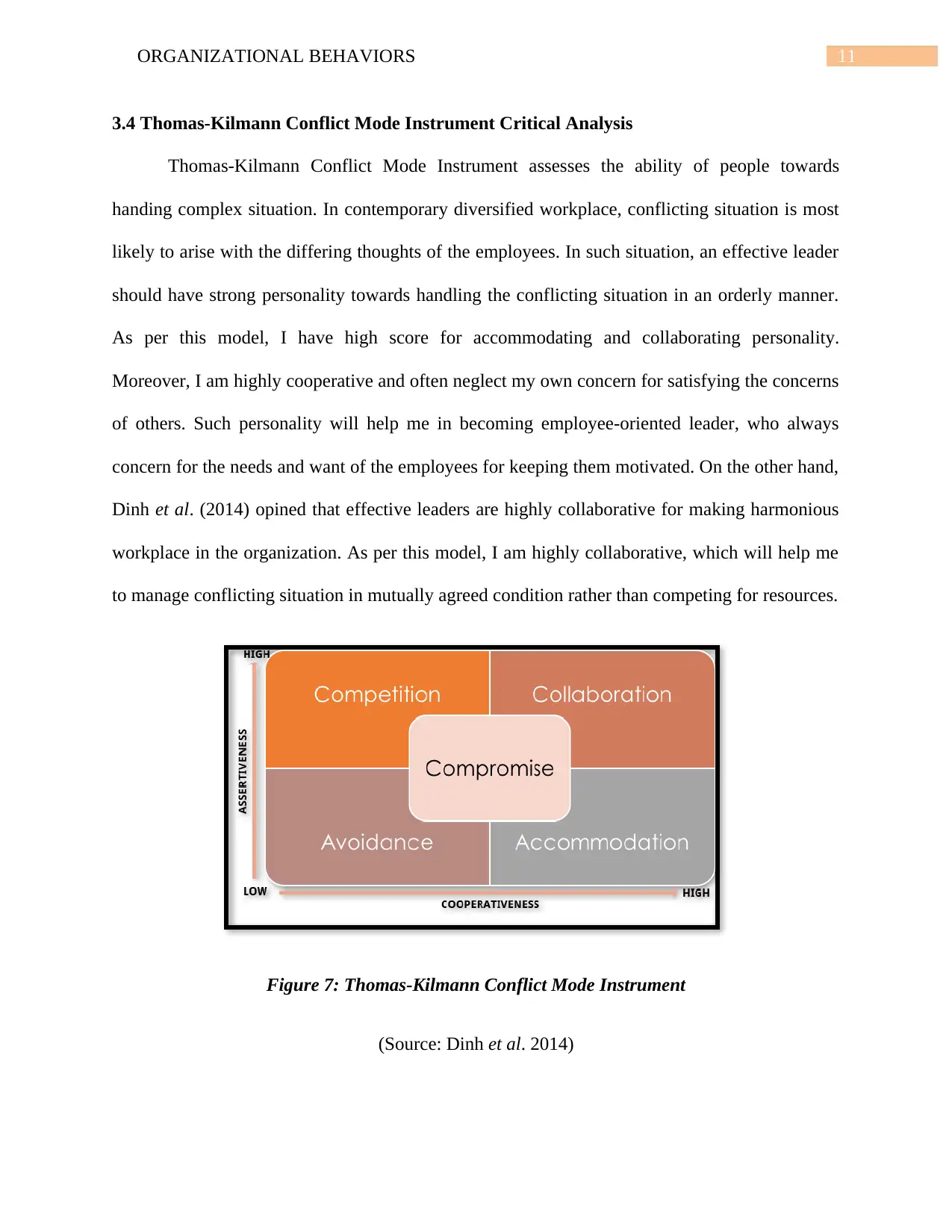
11ORGANIZATIONAL BEHAVIORS
3.4 Thomas-Kilmann Conflict Mode Instrument Critical Analysis
Thomas-Kilmann Conflict Mode Instrument assesses the ability of people towards
handing complex situation. In contemporary diversified workplace, conflicting situation is most
likely to arise with the differing thoughts of the employees. In such situation, an effective leader
should have strong personality towards handling the conflicting situation in an orderly manner.
As per this model, I have high score for accommodating and collaborating personality.
Moreover, I am highly cooperative and often neglect my own concern for satisfying the concerns
of others. Such personality will help me in becoming employee-oriented leader, who always
concern for the needs and want of the employees for keeping them motivated. On the other hand,
Dinh et al. (2014) opined that effective leaders are highly collaborative for making harmonious
workplace in the organization. As per this model, I am highly collaborative, which will help me
to manage conflicting situation in mutually agreed condition rather than competing for resources.
Figure 7: Thomas-Kilmann Conflict Mode Instrument
(Source: Dinh et al. 2014)
3.4 Thomas-Kilmann Conflict Mode Instrument Critical Analysis
Thomas-Kilmann Conflict Mode Instrument assesses the ability of people towards
handing complex situation. In contemporary diversified workplace, conflicting situation is most
likely to arise with the differing thoughts of the employees. In such situation, an effective leader
should have strong personality towards handling the conflicting situation in an orderly manner.
As per this model, I have high score for accommodating and collaborating personality.
Moreover, I am highly cooperative and often neglect my own concern for satisfying the concerns
of others. Such personality will help me in becoming employee-oriented leader, who always
concern for the needs and want of the employees for keeping them motivated. On the other hand,
Dinh et al. (2014) opined that effective leaders are highly collaborative for making harmonious
workplace in the organization. As per this model, I am highly collaborative, which will help me
to manage conflicting situation in mutually agreed condition rather than competing for resources.
Figure 7: Thomas-Kilmann Conflict Mode Instrument
(Source: Dinh et al. 2014)
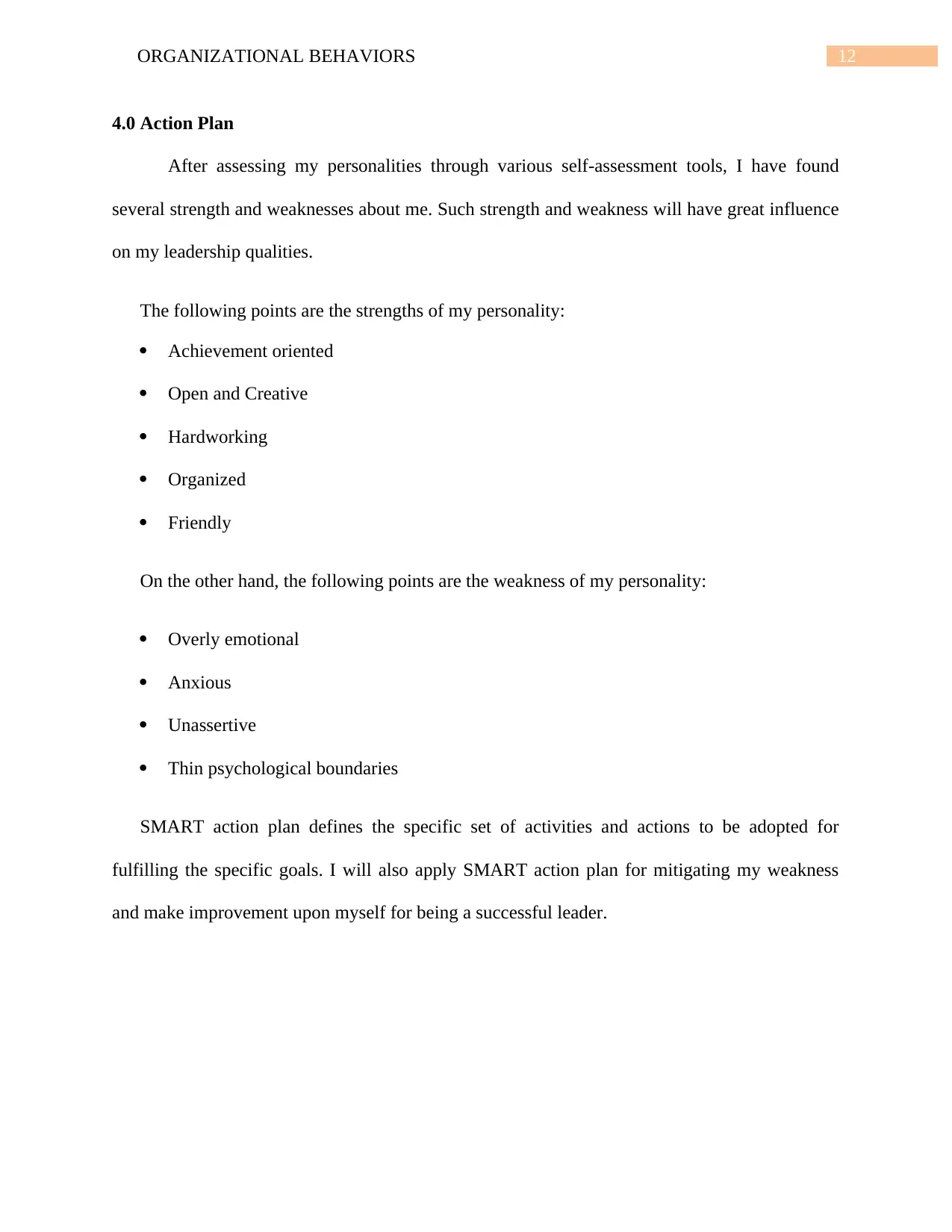
12ORGANIZATIONAL BEHAVIORS
4.0 Action Plan
After assessing my personalities through various self-assessment tools, I have found
several strength and weaknesses about me. Such strength and weakness will have great influence
on my leadership qualities.
The following points are the strengths of my personality:
Achievement oriented
Open and Creative
Hardworking
Organized
Friendly
On the other hand, the following points are the weakness of my personality:
Overly emotional
Anxious
Unassertive
Thin psychological boundaries
SMART action plan defines the specific set of activities and actions to be adopted for
fulfilling the specific goals. I will also apply SMART action plan for mitigating my weakness
and make improvement upon myself for being a successful leader.
4.0 Action Plan
After assessing my personalities through various self-assessment tools, I have found
several strength and weaknesses about me. Such strength and weakness will have great influence
on my leadership qualities.
The following points are the strengths of my personality:
Achievement oriented
Open and Creative
Hardworking
Organized
Friendly
On the other hand, the following points are the weakness of my personality:
Overly emotional
Anxious
Unassertive
Thin psychological boundaries
SMART action plan defines the specific set of activities and actions to be adopted for
fulfilling the specific goals. I will also apply SMART action plan for mitigating my weakness
and make improvement upon myself for being a successful leader.
Paraphrase This Document
Need a fresh take? Get an instant paraphrase of this document with our AI Paraphraser
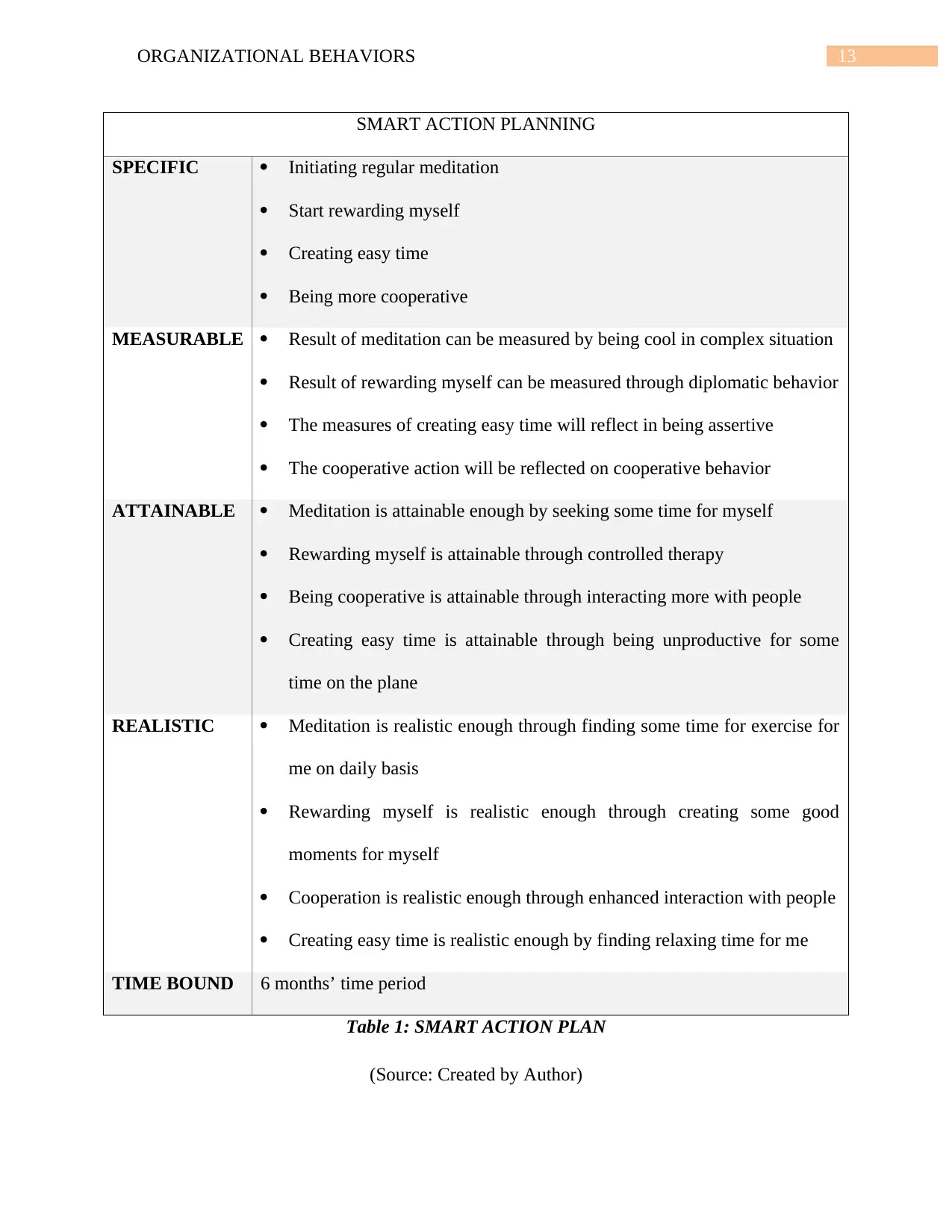
13ORGANIZATIONAL BEHAVIORS
SMART ACTION PLANNING
SPECIFIC Initiating regular meditation
Start rewarding myself
Creating easy time
Being more cooperative
MEASURABLE Result of meditation can be measured by being cool in complex situation
Result of rewarding myself can be measured through diplomatic behavior
The measures of creating easy time will reflect in being assertive
The cooperative action will be reflected on cooperative behavior
ATTAINABLE Meditation is attainable enough by seeking some time for myself
Rewarding myself is attainable through controlled therapy
Being cooperative is attainable through interacting more with people
Creating easy time is attainable through being unproductive for some
time on the plane
REALISTIC Meditation is realistic enough through finding some time for exercise for
me on daily basis
Rewarding myself is realistic enough through creating some good
moments for myself
Cooperation is realistic enough through enhanced interaction with people
Creating easy time is realistic enough by finding relaxing time for me
TIME BOUND 6 months’ time period
Table 1: SMART ACTION PLAN
(Source: Created by Author)
SMART ACTION PLANNING
SPECIFIC Initiating regular meditation
Start rewarding myself
Creating easy time
Being more cooperative
MEASURABLE Result of meditation can be measured by being cool in complex situation
Result of rewarding myself can be measured through diplomatic behavior
The measures of creating easy time will reflect in being assertive
The cooperative action will be reflected on cooperative behavior
ATTAINABLE Meditation is attainable enough by seeking some time for myself
Rewarding myself is attainable through controlled therapy
Being cooperative is attainable through interacting more with people
Creating easy time is attainable through being unproductive for some
time on the plane
REALISTIC Meditation is realistic enough through finding some time for exercise for
me on daily basis
Rewarding myself is realistic enough through creating some good
moments for myself
Cooperation is realistic enough through enhanced interaction with people
Creating easy time is realistic enough by finding relaxing time for me
TIME BOUND 6 months’ time period
Table 1: SMART ACTION PLAN
(Source: Created by Author)
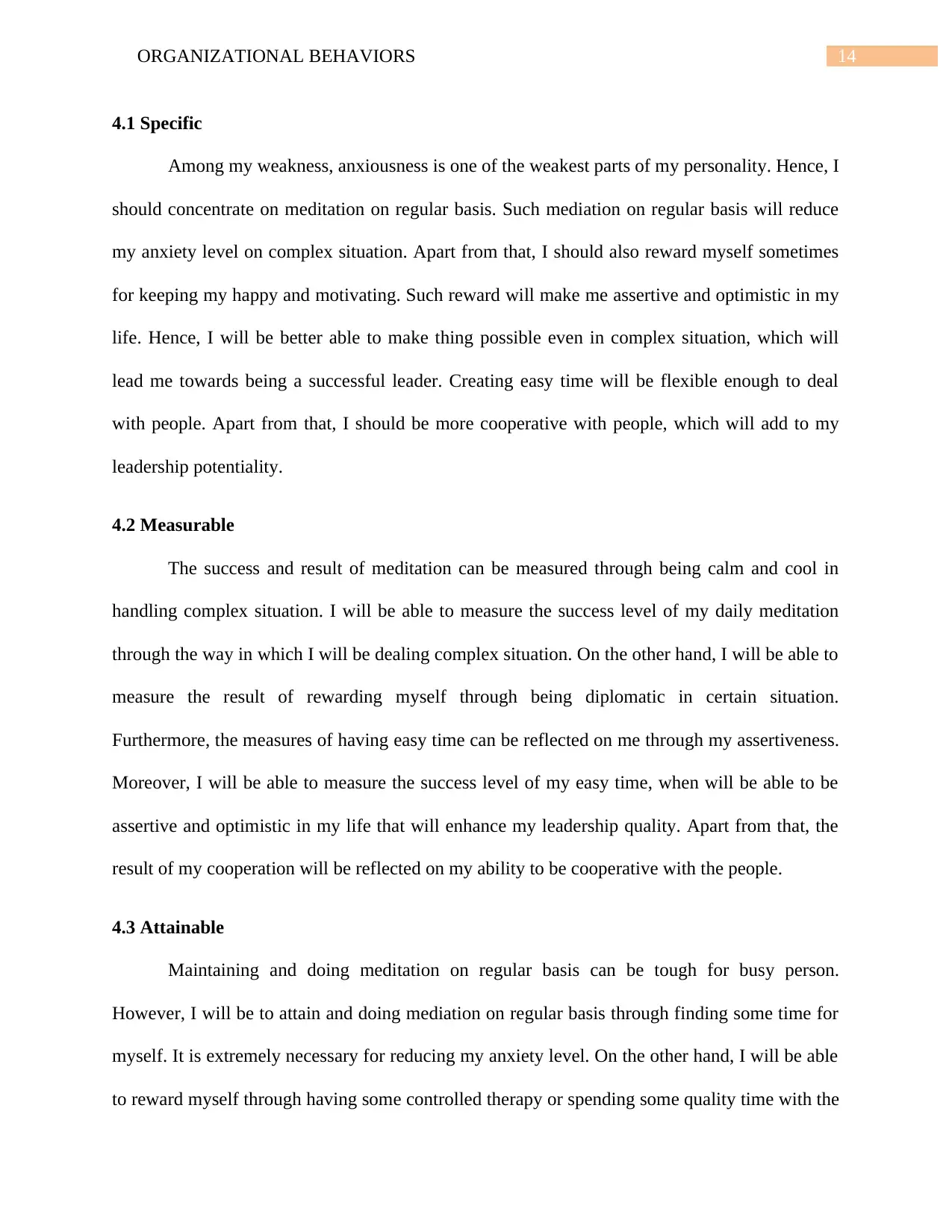
14ORGANIZATIONAL BEHAVIORS
4.1 Specific
Among my weakness, anxiousness is one of the weakest parts of my personality. Hence, I
should concentrate on meditation on regular basis. Such mediation on regular basis will reduce
my anxiety level on complex situation. Apart from that, I should also reward myself sometimes
for keeping my happy and motivating. Such reward will make me assertive and optimistic in my
life. Hence, I will be better able to make thing possible even in complex situation, which will
lead me towards being a successful leader. Creating easy time will be flexible enough to deal
with people. Apart from that, I should be more cooperative with people, which will add to my
leadership potentiality.
4.2 Measurable
The success and result of meditation can be measured through being calm and cool in
handling complex situation. I will be able to measure the success level of my daily meditation
through the way in which I will be dealing complex situation. On the other hand, I will be able to
measure the result of rewarding myself through being diplomatic in certain situation.
Furthermore, the measures of having easy time can be reflected on me through my assertiveness.
Moreover, I will be able to measure the success level of my easy time, when will be able to be
assertive and optimistic in my life that will enhance my leadership quality. Apart from that, the
result of my cooperation will be reflected on my ability to be cooperative with the people.
4.3 Attainable
Maintaining and doing meditation on regular basis can be tough for busy person.
However, I will be to attain and doing mediation on regular basis through finding some time for
myself. It is extremely necessary for reducing my anxiety level. On the other hand, I will be able
to reward myself through having some controlled therapy or spending some quality time with the
4.1 Specific
Among my weakness, anxiousness is one of the weakest parts of my personality. Hence, I
should concentrate on meditation on regular basis. Such mediation on regular basis will reduce
my anxiety level on complex situation. Apart from that, I should also reward myself sometimes
for keeping my happy and motivating. Such reward will make me assertive and optimistic in my
life. Hence, I will be better able to make thing possible even in complex situation, which will
lead me towards being a successful leader. Creating easy time will be flexible enough to deal
with people. Apart from that, I should be more cooperative with people, which will add to my
leadership potentiality.
4.2 Measurable
The success and result of meditation can be measured through being calm and cool in
handling complex situation. I will be able to measure the success level of my daily meditation
through the way in which I will be dealing complex situation. On the other hand, I will be able to
measure the result of rewarding myself through being diplomatic in certain situation.
Furthermore, the measures of having easy time can be reflected on me through my assertiveness.
Moreover, I will be able to measure the success level of my easy time, when will be able to be
assertive and optimistic in my life that will enhance my leadership quality. Apart from that, the
result of my cooperation will be reflected on my ability to be cooperative with the people.
4.3 Attainable
Maintaining and doing meditation on regular basis can be tough for busy person.
However, I will be to attain and doing mediation on regular basis through finding some time for
myself. It is extremely necessary for reducing my anxiety level. On the other hand, I will be able
to reward myself through having some controlled therapy or spending some quality time with the
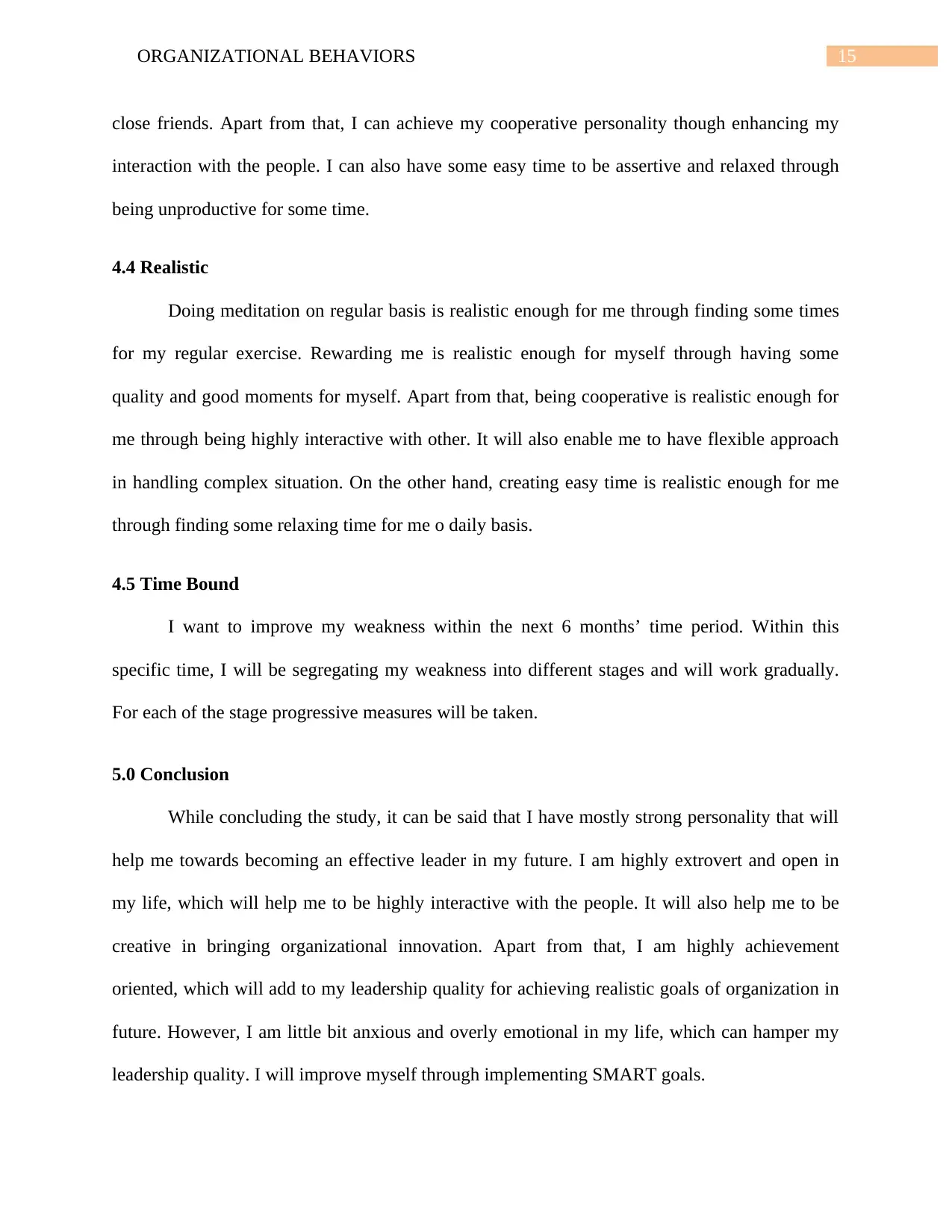
15ORGANIZATIONAL BEHAVIORS
close friends. Apart from that, I can achieve my cooperative personality though enhancing my
interaction with the people. I can also have some easy time to be assertive and relaxed through
being unproductive for some time.
4.4 Realistic
Doing meditation on regular basis is realistic enough for me through finding some times
for my regular exercise. Rewarding me is realistic enough for myself through having some
quality and good moments for myself. Apart from that, being cooperative is realistic enough for
me through being highly interactive with other. It will also enable me to have flexible approach
in handling complex situation. On the other hand, creating easy time is realistic enough for me
through finding some relaxing time for me o daily basis.
4.5 Time Bound
I want to improve my weakness within the next 6 months’ time period. Within this
specific time, I will be segregating my weakness into different stages and will work gradually.
For each of the stage progressive measures will be taken.
5.0 Conclusion
While concluding the study, it can be said that I have mostly strong personality that will
help me towards becoming an effective leader in my future. I am highly extrovert and open in
my life, which will help me to be highly interactive with the people. It will also help me to be
creative in bringing organizational innovation. Apart from that, I am highly achievement
oriented, which will add to my leadership quality for achieving realistic goals of organization in
future. However, I am little bit anxious and overly emotional in my life, which can hamper my
leadership quality. I will improve myself through implementing SMART goals.
close friends. Apart from that, I can achieve my cooperative personality though enhancing my
interaction with the people. I can also have some easy time to be assertive and relaxed through
being unproductive for some time.
4.4 Realistic
Doing meditation on regular basis is realistic enough for me through finding some times
for my regular exercise. Rewarding me is realistic enough for myself through having some
quality and good moments for myself. Apart from that, being cooperative is realistic enough for
me through being highly interactive with other. It will also enable me to have flexible approach
in handling complex situation. On the other hand, creating easy time is realistic enough for me
through finding some relaxing time for me o daily basis.
4.5 Time Bound
I want to improve my weakness within the next 6 months’ time period. Within this
specific time, I will be segregating my weakness into different stages and will work gradually.
For each of the stage progressive measures will be taken.
5.0 Conclusion
While concluding the study, it can be said that I have mostly strong personality that will
help me towards becoming an effective leader in my future. I am highly extrovert and open in
my life, which will help me to be highly interactive with the people. It will also help me to be
creative in bringing organizational innovation. Apart from that, I am highly achievement
oriented, which will add to my leadership quality for achieving realistic goals of organization in
future. However, I am little bit anxious and overly emotional in my life, which can hamper my
leadership quality. I will improve myself through implementing SMART goals.
Secure Best Marks with AI Grader
Need help grading? Try our AI Grader for instant feedback on your assignments.
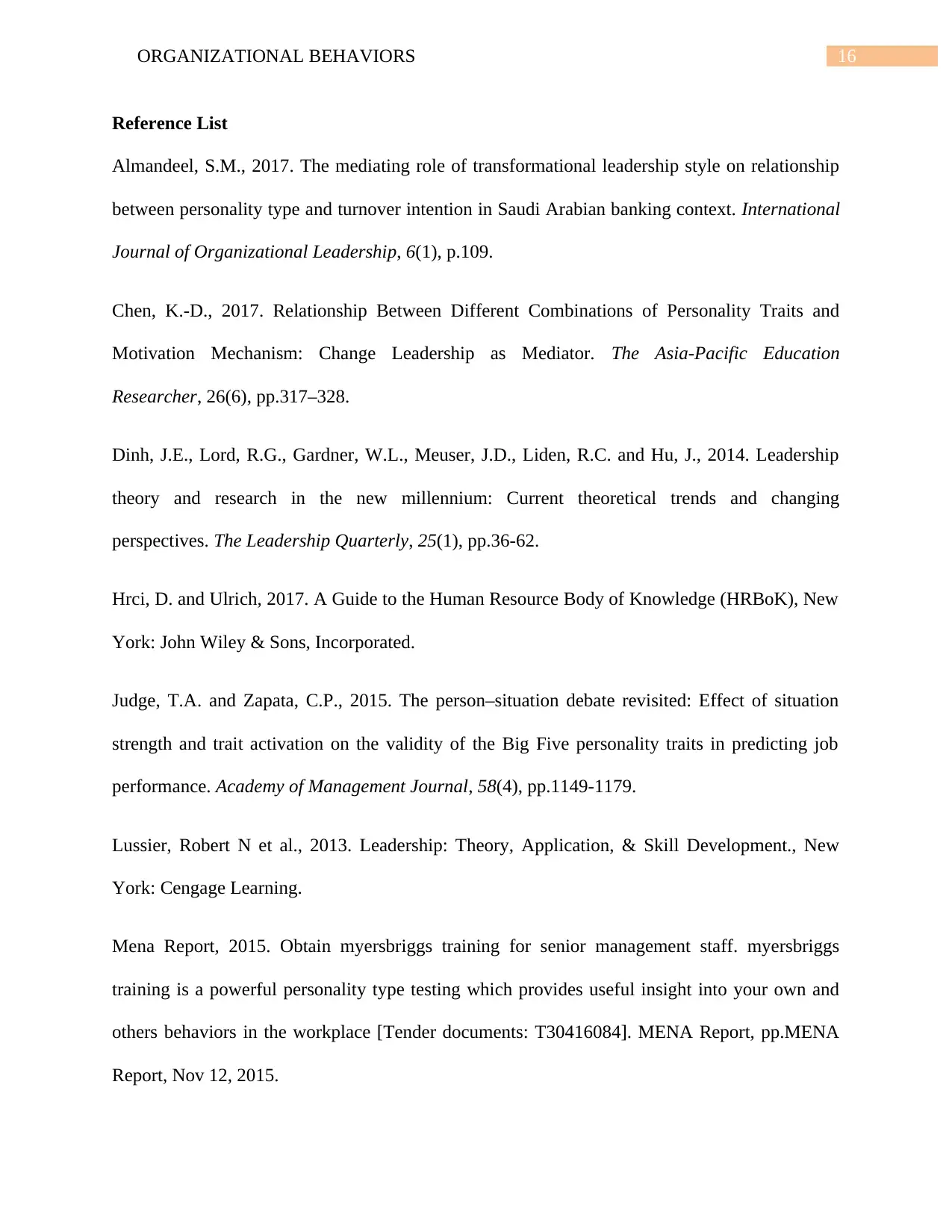
16ORGANIZATIONAL BEHAVIORS
Reference List
Almandeel, S.M., 2017. The mediating role of transformational leadership style on relationship
between personality type and turnover intention in Saudi Arabian banking context. International
Journal of Organizational Leadership, 6(1), p.109.
Chen, K.-D., 2017. Relationship Between Different Combinations of Personality Traits and
Motivation Mechanism: Change Leadership as Mediator. The Asia-Pacific Education
Researcher, 26(6), pp.317–328.
Dinh, J.E., Lord, R.G., Gardner, W.L., Meuser, J.D., Liden, R.C. and Hu, J., 2014. Leadership
theory and research in the new millennium: Current theoretical trends and changing
perspectives. The Leadership Quarterly, 25(1), pp.36-62.
Hrci, D. and Ulrich, 2017. A Guide to the Human Resource Body of Knowledge (HRBoK), New
York: John Wiley & Sons, Incorporated.
Judge, T.A. and Zapata, C.P., 2015. The person–situation debate revisited: Effect of situation
strength and trait activation on the validity of the Big Five personality traits in predicting job
performance. Academy of Management Journal, 58(4), pp.1149-1179.
Lussier, Robert N et al., 2013. Leadership: Theory, Application, & Skill Development., New
York: Cengage Learning.
Mena Report, 2015. Obtain myersbriggs training for senior management staff. myersbriggs
training is a powerful personality type testing which provides useful insight into your own and
others behaviors in the workplace [Tender documents: T30416084]. MENA Report, pp.MENA
Report, Nov 12, 2015.
Reference List
Almandeel, S.M., 2017. The mediating role of transformational leadership style on relationship
between personality type and turnover intention in Saudi Arabian banking context. International
Journal of Organizational Leadership, 6(1), p.109.
Chen, K.-D., 2017. Relationship Between Different Combinations of Personality Traits and
Motivation Mechanism: Change Leadership as Mediator. The Asia-Pacific Education
Researcher, 26(6), pp.317–328.
Dinh, J.E., Lord, R.G., Gardner, W.L., Meuser, J.D., Liden, R.C. and Hu, J., 2014. Leadership
theory and research in the new millennium: Current theoretical trends and changing
perspectives. The Leadership Quarterly, 25(1), pp.36-62.
Hrci, D. and Ulrich, 2017. A Guide to the Human Resource Body of Knowledge (HRBoK), New
York: John Wiley & Sons, Incorporated.
Judge, T.A. and Zapata, C.P., 2015. The person–situation debate revisited: Effect of situation
strength and trait activation on the validity of the Big Five personality traits in predicting job
performance. Academy of Management Journal, 58(4), pp.1149-1179.
Lussier, Robert N et al., 2013. Leadership: Theory, Application, & Skill Development., New
York: Cengage Learning.
Mena Report, 2015. Obtain myersbriggs training for senior management staff. myersbriggs
training is a powerful personality type testing which provides useful insight into your own and
others behaviors in the workplace [Tender documents: T30416084]. MENA Report, pp.MENA
Report, Nov 12, 2015.
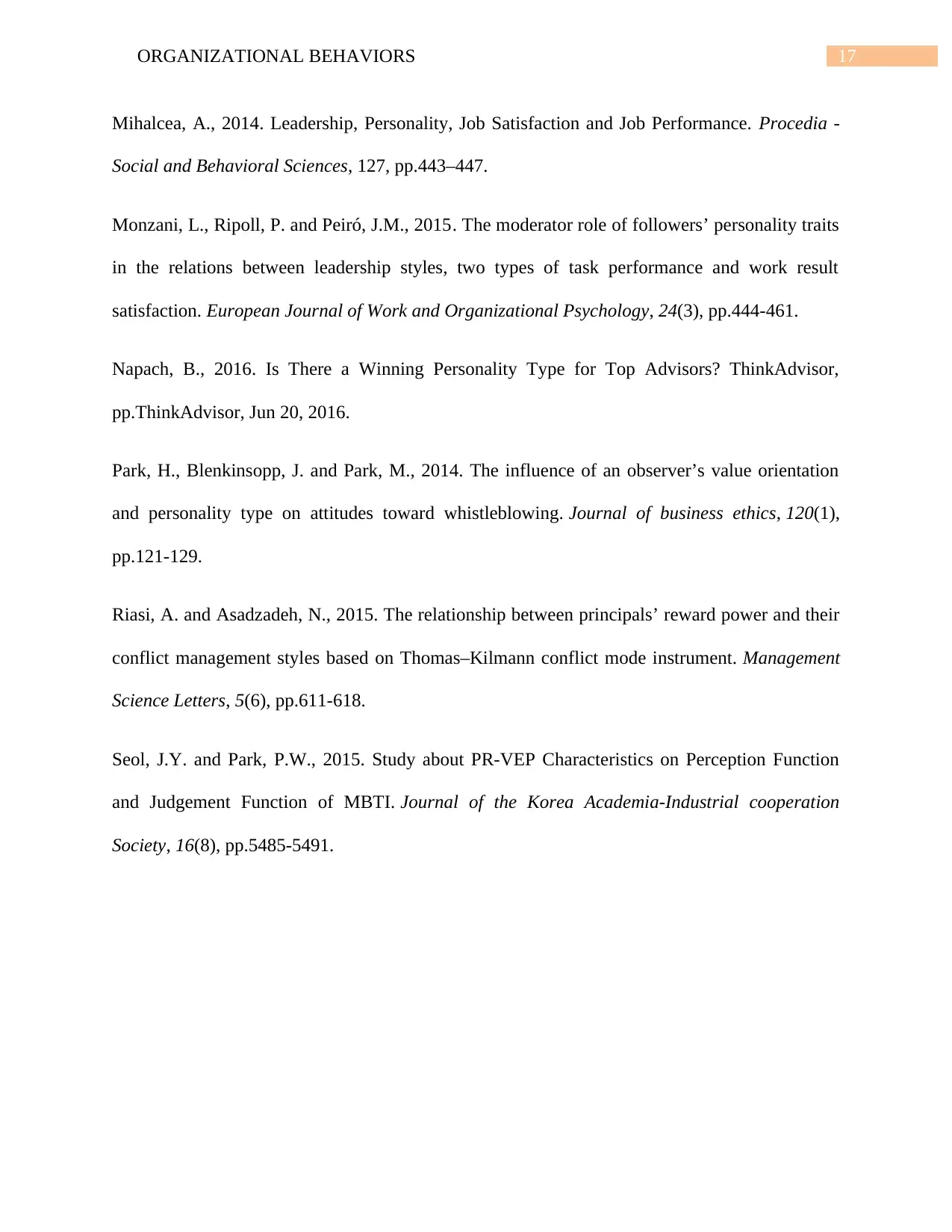
17ORGANIZATIONAL BEHAVIORS
Mihalcea, A., 2014. Leadership, Personality, Job Satisfaction and Job Performance. Procedia -
Social and Behavioral Sciences, 127, pp.443–447.
Monzani, L., Ripoll, P. and Peiró, J.M., 2015. The moderator role of followers’ personality traits
in the relations between leadership styles, two types of task performance and work result
satisfaction. European Journal of Work and Organizational Psychology, 24(3), pp.444-461.
Napach, B., 2016. Is There a Winning Personality Type for Top Advisors? ThinkAdvisor,
pp.ThinkAdvisor, Jun 20, 2016.
Park, H., Blenkinsopp, J. and Park, M., 2014. The influence of an observer’s value orientation
and personality type on attitudes toward whistleblowing. Journal of business ethics, 120(1),
pp.121-129.
Riasi, A. and Asadzadeh, N., 2015. The relationship between principals’ reward power and their
conflict management styles based on Thomas–Kilmann conflict mode instrument. Management
Science Letters, 5(6), pp.611-618.
Seol, J.Y. and Park, P.W., 2015. Study about PR-VEP Characteristics on Perception Function
and Judgement Function of MBTI. Journal of the Korea Academia-Industrial cooperation
Society, 16(8), pp.5485-5491.
Mihalcea, A., 2014. Leadership, Personality, Job Satisfaction and Job Performance. Procedia -
Social and Behavioral Sciences, 127, pp.443–447.
Monzani, L., Ripoll, P. and Peiró, J.M., 2015. The moderator role of followers’ personality traits
in the relations between leadership styles, two types of task performance and work result
satisfaction. European Journal of Work and Organizational Psychology, 24(3), pp.444-461.
Napach, B., 2016. Is There a Winning Personality Type for Top Advisors? ThinkAdvisor,
pp.ThinkAdvisor, Jun 20, 2016.
Park, H., Blenkinsopp, J. and Park, M., 2014. The influence of an observer’s value orientation
and personality type on attitudes toward whistleblowing. Journal of business ethics, 120(1),
pp.121-129.
Riasi, A. and Asadzadeh, N., 2015. The relationship between principals’ reward power and their
conflict management styles based on Thomas–Kilmann conflict mode instrument. Management
Science Letters, 5(6), pp.611-618.
Seol, J.Y. and Park, P.W., 2015. Study about PR-VEP Characteristics on Perception Function
and Judgement Function of MBTI. Journal of the Korea Academia-Industrial cooperation
Society, 16(8), pp.5485-5491.
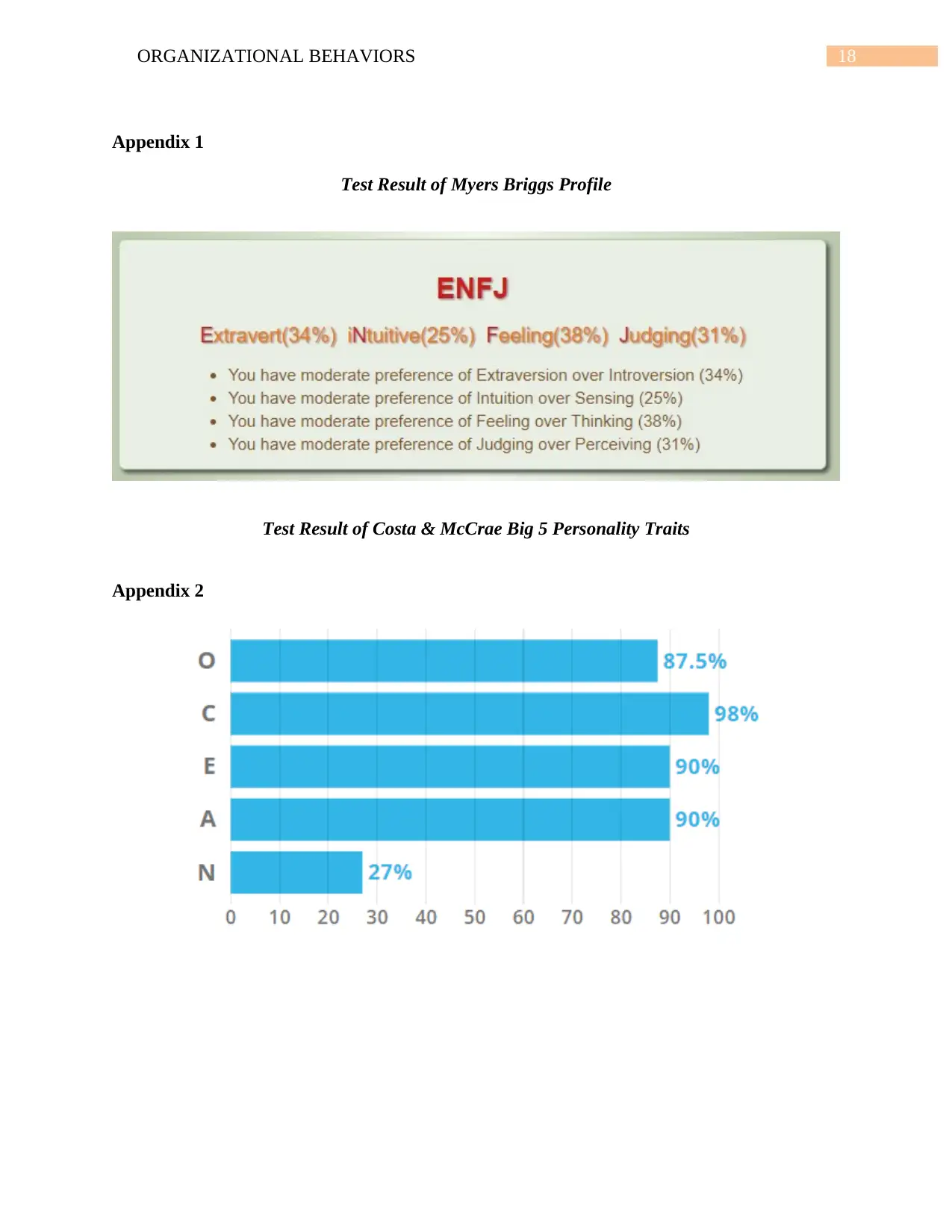
18ORGANIZATIONAL BEHAVIORS
Appendix 1
Test Result of Myers Briggs Profile
Test Result of Costa & McCrae Big 5 Personality Traits
Appendix 2
Appendix 1
Test Result of Myers Briggs Profile
Test Result of Costa & McCrae Big 5 Personality Traits
Appendix 2
1 out of 19
Related Documents
Your All-in-One AI-Powered Toolkit for Academic Success.
+13062052269
info@desklib.com
Available 24*7 on WhatsApp / Email
![[object Object]](/_next/static/media/star-bottom.7253800d.svg)
Unlock your academic potential
© 2024 | Zucol Services PVT LTD | All rights reserved.





